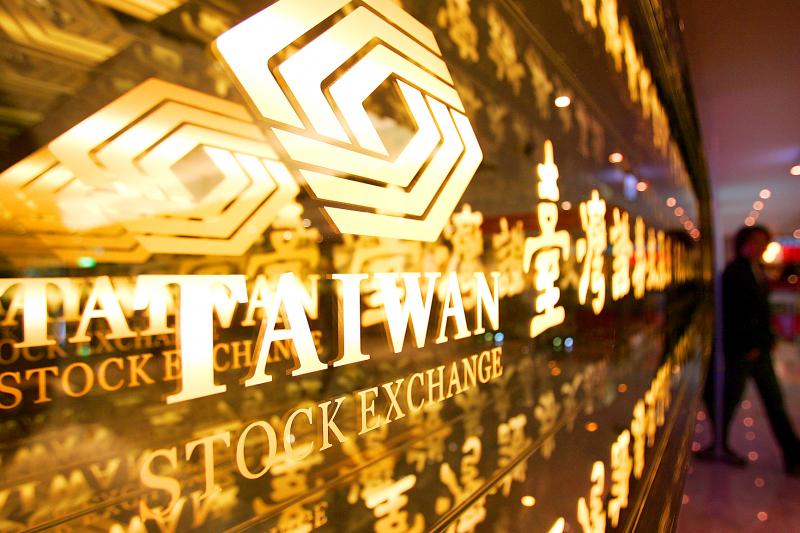The combined revenue of companies listed on the Taiwan Stock Exchange last month increased 11.97 percent year-on-year to NT$3.145 trillion (US$113.5 billion), the bourse said on Saturday.
The exchange said in a statement that 661 firms reported revenue growth, while 292 reported a decline.
The combined revenue of listed firms last grew 14.16 percent from August 2019, before COVID-19 was a factor, it added.

Photo: Bloomberg
The highest increases last month were reported in shipping and transportation; oil, gas and electricity; and plastics, the exchange said.
The uptick in the shipping and transportation industry came as imbalanced supply and demand dynamics amid the COVID-19 pandemic boosted freight volumes and rates, benefiting major players in the sector’s peak season, it said.
Evergreen Marine Corp (長榮海運), the nation’s largest container shipping firm in terms of fleet size, on Friday reported record monthly revenue of NT$50.02 billion for last month, up 9.03 percent month-on-month and 164.79 percent year-on-year.
Yang Ming Marine Transport Corp (陽明海運), the second largest, said revenue last month rose 11.34 percent monthly and 151.33 percent annually to NT$32.79 billion, while Wan Hai Lines Ltd (萬海航運), the third largest, saw revenue increase 21.49 percent from the previous month and 278.07 percent from a year earlier to NT$24.66 billion.
The oil, gas and electricity industry benefited from rising raw material prices for petrochemicals caused by higher oil prices, while plastics producers cited increased demand for products and rising prices as factors behind their rising sales, the exchange said.
Tourism, financial and insurance industries, and some electronics sectors reported relatively large revenue declines last month, as the tourism industry continued to be affected by COVID-19 disease prevention measures, it said.
Some companies in the electronics industry posted a drop in revenue as their customers underwent a product transition period, while revenue in the financial and insurance industry declined due to lower net income at insurers, it said.
Accumulated revenue for the 953 listed firms in the first eight months of the year reached NT$24.1 trillion, up 18.61 percent year-on-year, the exchange said, adding that the increase compared with the same period in 2019 was 16.45 percent.
Firms in the shipping and transportation, plastics, and iron and steel industries reported the highest revenue increases during the eight-month period, the exchange added.

Sweeping policy changes under US Secretary of Health and Human Services Robert F. Kennedy Jr are having a chilling effect on vaccine makers as anti-vaccine rhetoric has turned into concrete changes in inoculation schedules and recommendations, investors and executives said. The administration of US President Donald Trump has in the past year upended vaccine recommendations, with the country last month ending its longstanding guidance that all children receive inoculations against flu, hepatitis A and other diseases. The unprecedented changes have led to diminished vaccine usage, hurt the investment case for some biotechs, and created a drag that would likely dent revenues and

Macronix International Co (旺宏), the world’s biggest NOR flash memory supplier, yesterday said it would spend NT$22 billion (US$699.1 million) on capacity expansion this year to increase its production of mid-to-low-density memory chips as the world’s major memorychip suppliers are phasing out the market. The company said its planned capital expenditures are about 11 times higher than the NT$1.8 billion it spent on new facilities and equipment last year. A majority of this year’s outlay would be allocated to step up capacity of multi-level cell (MLC) NAND flash memory chips, which are used in embedded multimedia cards (eMMC), a managed

CULPRITS: Factors that affected the slip included falling global crude oil prices, wait-and-see consumer attitudes due to US tariffs and a different Lunar New Year holiday schedule Taiwan’s retail sales ended a nine-year growth streak last year, slipping 0.2 percent from a year earlier as uncertainty over US tariff policies affected demand for durable goods, data released on Friday by the Ministry of Economic Affairs showed. Last year’s retail sales totaled NT$4.84 trillion (US$153.27 billion), down about NT$9.5 billion, or 0.2 percent, from 2024. Despite the decline, the figure was still the second-highest annual sales total on record. Ministry statistics department deputy head Chen Yu-fang (陳玉芳) said sales of cars, motorcycles and related products, which accounted for 17.4 percent of total retail rales last year, fell NT$68.1 billion, or

In the wake of strong global demand for AI applications, Taiwan’s export-oriented economy accelerated with the composite index of economic indicators flashing the first “red” light in December for one year, indicating the economy is in booming mode, the National Development Council (NDC) said yesterday. Moreover, the index of leading indicators, which gauges the potential state of the economy over the next six months, also moved higher in December amid growing optimism over the outlook, the NDC said. In December, the index of economic indicators rose one point from a month earlier to 38, at the lower end of the “red” light.